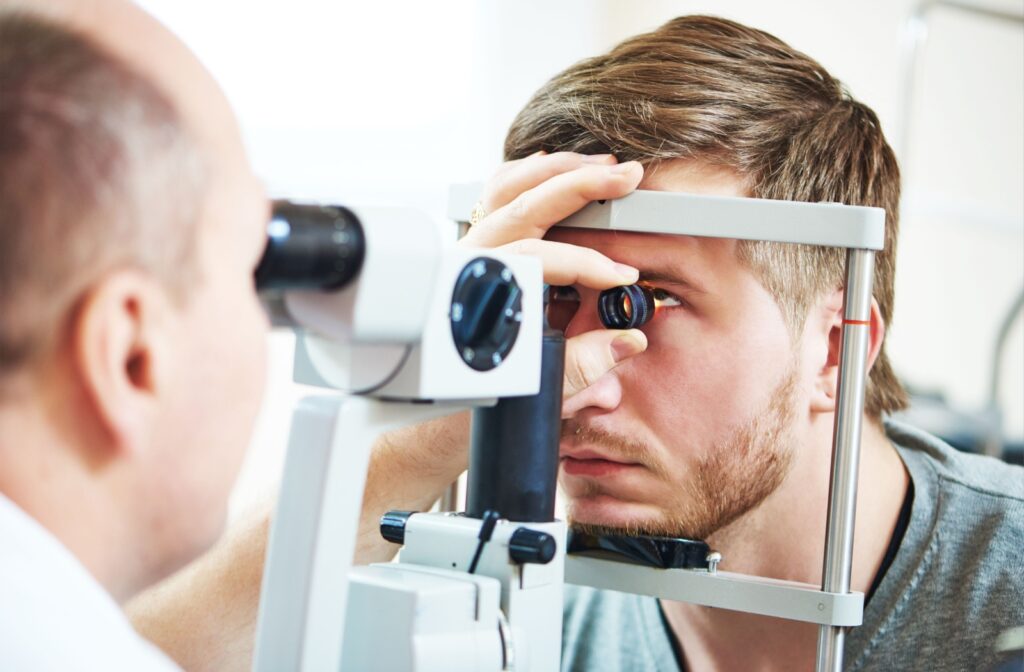Getting new glasses should feel like a clear upgrade, not a source of headaches or eye strain. But when your lenses are even slightly out of alignment, the result can be discomfort that builds throughout the day.
Pupil distance is the measurement that ensures your lenses match the position of your eyes, and it plays a bigger role in your comfort than most people realize. It’s an important part of having your glasses fit you.
Learning how this small number affects your vision can help you avoid common issues with new eyewear and choose glasses that truly fit your needs.
What is Pupil Distance & Why Does It Matter?
Pupillary distance, commonly abbreviated as PD, measures the distance between the centers of your pupils in millimeters. This measurement ensures that the optical centers of your eyeglass lenses align precisely with your pupils, creating the clearest possible vision through your prescription lenses.
When your PD measurement is accurate, light passes through the optimal part of each lens, reducing eye strain and providing crisp, comfortable vision. However, when this measurement is off, even by just a few millimeters, you may experience several uncomfortable symptoms that can impact your daily activities.
The Consequences of Incorrect Pupil Measurements
The symptoms of incorrect pupillary distance often develop gradually, making it easy to dismiss them as normal adjustment periods to new glasses.
- Visual discomfort and eye strain: When PD is off, your eyes work harder to focus through the wrong part of the lens, leading to eye fatigue that worsens throughout the day. Many people describe it as feeling like their eyes are “fighting” their glasses.
- Headaches and dizziness: Misaligned lenses can strain your visual system, causing persistent headaches and sometimes dizziness or a sensation that objects are shifting or swimming.
- Double vision and blurred vision: Incorrect PD can cause double vision or constant blurriness that doesn’t improve with blinking or adjusting your glasses.
- Reduced depth perception: Proper PD alignment is essential for judging distances. When it’s incorrect, depth perception suffers, which can make driving, sports, or walking downstairs feel less secure.
These symptoms may seem minor at first, but over time they can interfere with your comfort, focus, and confidence in everyday activities, highlighting the importance of getting your pupil distance measured correctly.
How Pupil Distance is Measured Professionally
Professional pupil distance measurement requires precision and proper technique, making it important to book an appointment with your eye care professional.
Professional Measurement Process
During your comprehensive eye exam, your optometrist measures PD using a pupillometer, an instrument designed specifically for this purpose. This device eliminates the guesswork and human error common in DIY measurement attempts.
The measurement process involves several steps to ensure accuracy. First, you’ll be positioned at the proper distance from the measuring device. Your optometrist will then align the instrument with your eyes while you focus on a target at the appropriate distance. Multiple measurements are typically taken to verify consistency and accuracy.
Distance vs. Near PD Measurements
Your pupil distance can vary slightly depending on whether you’re looking at distant objects or reading up close. This is because your eyes naturally converge (move closer together) when focusing on near objects.
For single-vision distance glasses, your optometrist measures your distance PD. For reading glasses or the reading portion of progressive lenses, a near PD measurement is important. Bifocal and progressive lens wearers often need both measurements to help with improving vision at all distances.
Accounting for Individual Variations
Not everyone has perfectly symmetrical facial features. Some patients have slight variations in the position of their pupils relative to their nose bridge. Professional measurement accounts for these individual differences, helping ensure that each lens is positioned correctly for better vision.

Special Considerations for Different Lens Types
Different types of eyeglass lenses have varying requirements for pupil distance accuracy, making professional measurement even more critical for certain prescriptions.
Progressive & Multifocal Lenses
Progressive lenses require precise PD measurements because they contain multiple vision zones within each lens. The distance, intermediate, and near vision areas must align with your natural eye movements.
High Prescription Lenses
Patients with strong prescriptions (high plus or minus powers) are particularly sensitive to PD errors. The thicker lens edges and greater optical power magnify any alignment issues, making accurate measurement important for comfortable vision.
Speciality Lenses
Occupational lenses, computer glasses, and other specialty eyewear often have unique PD requirements based on their intended use. Professional measurement helps these specialized lenses provide the intended benefits.
The Value of Professional Eyeglass Fitting
Choosing to purchase your glasses from your optometrist’s office, provides several benefits that support both immediate comfort and long-term eye health:
- Comprehensive service and support: You receive more than just glasses—you gain access to follow-up adjustments, warranty support, and expert advice on lens care and maintenance.
- Quality assurance: Your optometrist recommends high-quality frames and lenses tailored to your prescription, visual needs, and lifestyle, ensuring long-lasting comfort and clarity.
- Ongoing relationship: Staying with your eye care provider keeps your vision history and future care connected, allowing for more personalized support as your needs evolve.
These benefits make professional eyeglass fitting a smart, long-term investment in your visual comfort and overall eye health.
The Value of Professional Eyeglass Fitting
Ready for glasses that feel right and work better? Book a professional fitting with Total Vision La Mesa today and see the difference that accurate measurements and personalized care can make for your everyday comfort and clarity.



